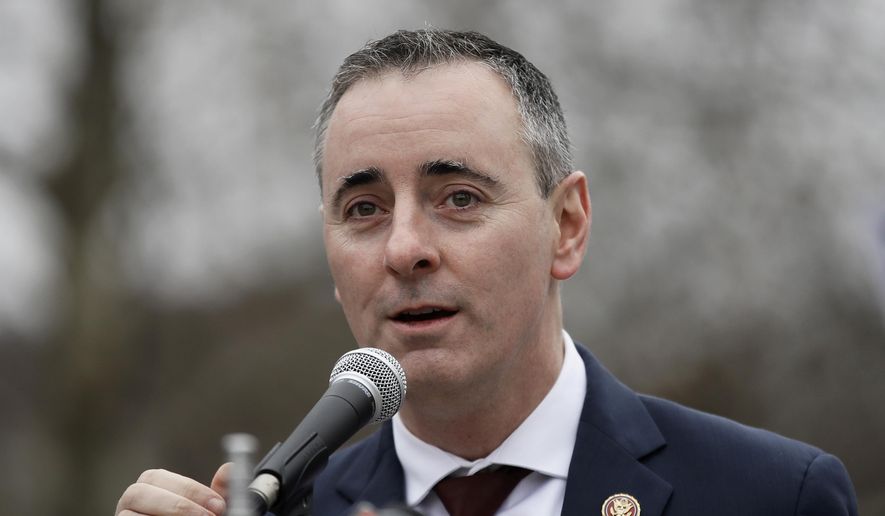President Biden’s calls for the creation of a national climate bank — intended to bolster investment in green energy and wean the country off — fossil fuels were endorsed Wednesday by two Republican members of Congress from energy states.
Reps. Don Young of Alaska and Brian Fitzpatrick of Pennsylvania threw their weight behind the proposal, urging that it be included in the president’s upcoming infrastructure package.
The duo, along with Democratic Reps. Paul Tonko of New York and Debbie Dingell of Michigan, made the arguments in a letter to House leadership.
“With support from the White House, growing demand for green bank capital from state leaders of both parties, and bipartisan co-sponsorship in Congress, this policy should pass both the House and the Senate with strong bipartisan support and should be part of any future infrastructure package considered in the House,” the representatives wrote. “We do not have a moment to lose in this climate fight.”
Mr. Young and Mr. Fitzpatrick’s endorsement comes as Democrats and the Biden administration weigh whether there is sufficient political support in Congress for a climate bank.
Legislation creating a national climate bank has been introduced in the Senate regularly since at least 2019.
The current bill, which is sponsored by Democratic Sens. Ed Markey of Massachusetts and Chris Van Hollen of Maryland, would establish the bank as an independent nonprofit.
Funded by U.S. tax dollars, the bank would make direct investments in projects “that reduce carbon emissions [and] support workers and communities negatively impacted by the climate transition.”
At least 40% of its loans would be required to go to low-income and minority communities.
Such a policy “will ensure that no community is left behind in the transition to a clean energy future,” according to Mr. Young and Mr. Fitzpatrick.
At its inception, the bank would receive $50 billion in public funding, with an additional $10 billion provided annually over a five-year period.
In total, the venture would require $100 billion in federal tax dollars, but proponents claim over time the loans would generate as much as $884 billion in private clean energy investment.
“Put simply we need a national [climate bank] to put Americans at work at the cutting edge of a clean energy economy,” Mr. Van Hollen said at a recent hearing on the bill. “If we don’t get into this game more seriously we will fall further and further behind on clean energy.”
The legislation would also require the federal bank to provide “technical assistance” and funding for state and local governments to set up their own climate banks.
Local banks would then be responsible for providing smaller loans to individuals to offset the cost of solar-panel installations and retrofitting homes to clean energy standards.
Overall the legislation’s goal is to hasten the country’s transition away from fossil fuels. Republicans, however, have questioned the effectiveness of such a strategy.
“We know that when the government substitutes its judgment for that of the market, it picks winners and losers based on political favoritism, not business fundamentals,” said Sen. Pat Toomey of Pennsylvania, the ranking Republican member of the Senate Banking Committee.
GOP lawmakers opposing the legislation point to the more than $80 billion in loan guarantees and tax credits given to green-energy projects in former President Barack Obama’s 2009 stimulus program.
In that case, tax dollars went to several high-profile projects that either never got off the ground or failed to repay the initial federal investment. Most notable was Solyndra, a solar-panel manufacturer that received $535 million in Obama-era loans before filing for bankruptcy in 2011 without ever generating a profit.
Republicans like Mr. Young and Mr. Fitzpatrick, however, view the issue differently.
“We are confronting multiple and intersecting crises — the COVID-19 pandemic, an economy in turmoil, societal injustice, and, above all, the climate crisis — all of which demand swift and bold action,” the duo wrote in their letter. “Given the gravity and scale of the crises we are facing, it cannot be overstated how important this level of funding is for this effort to be a true success.”
• Haris Alic can be reached at halic@washingtontimes.com.




Please read our comment policy before commenting.